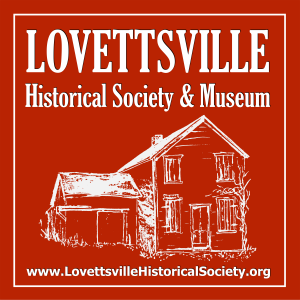Representatives of the Family & Friends of Mount Sinai Cemetery and the Lovettsville Historical Society addressed the Loudoun County Board of Supervisors on April 19, urging the Board to take measures to restore and preserve the abandoned cemetery near Lovettsville.
Last November, the Loudoun County Board of Supervisors unanimously adopted a Board Member Initiative, which directed County Staff look into options for either acquiring the cemetery property, or to take other measures to preserve and protect the historic property.
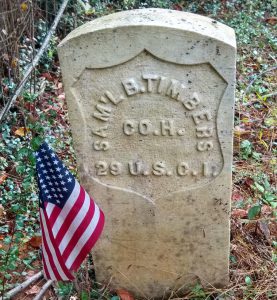
The first speaker on Mount Sinai during the public comment portion of the April 19 Board meeting was Howard Gilbert Timbers, who was raised in Loudoun County and graduated from Loudoun Valley High School; he now lives in upstate New York, from where he addressed the meeting remotely. Timbers introduced the Board to his great-great-grandfather, Samuel Benjamin Timbers, who served in the 29th Regiment, U.S. Colored Infantry, during the Civil War. Samuel Timbers was born in 1848 and raised as a free Black child in the Little Britain neighborhood near Lovettsville. His regiment was present for the Union victory at Petersburg and was among the first to enter Richmond after the Confederate forces withdrew. It is likely that Timbers was present at Appomattox for Lee’s surrender. Timbers and his regiment were then deployed to the Rio Grande in Texas to guard the border against any Confederate resurgence. Private Timbers is buried at Mount Sinai cemetery, and his headstone was restored in recent years by Kenneth Fleming.
After Mr. Timbers spoke, Chair Randall thanked him for the history lesson, and asked that he send a copy of his remarks to the Board.
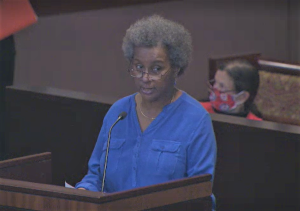
Next to speak was Claudette Bard, who pointed out that her connection to the Mount Sinai Cemetery is very personal. In the course of her extensive research, she found members of the Curtis family buried there. There are Curtises in her family tree, Mrs. Bard said, and every year her family holds the “Anderson-Curtis Family Reunion.” She noted that the Mount Sinai Cemetery is overgrown with weeds and brush, and that there is even the remains of a hog pen, which was built over probable burial sites.
Mrs. Bard said her research provides a picture of what life was like in this once-thriving African-American community. These Black Loudoun County citizens were farmers, laborers, and domestic workers. The Mount Sinai Free Will Baptist Church was a focal point of the community, with church services on Sundays, and holding public school during the week. She stressed how important it would be if the County were to purchase this property and develop it into an important historical site of African-American history for future generations. “This history cannot be lost,” Mrs. Bard concluded.
Comments by Ed Spannaus centered on the unique history of Mount Sinai Church and Cemetery, starting with the neighborhood – that in the 1700s the area was settled by Germans who built log cabins, then after the Civil War, the community became mostly Black and remained that way until around 1920. The Mount Sinai Church was founded in 1883 as a mission of the Free Will Baptists, abolitionists from New England who came South during the Civil War to educate newly-freed slaves. These were the people who founded Storer College in Harpers Ferry. The earliest known burial in the church cemetery was in 1887, and burials continued up until 1955 – long after the church itself became inactive.
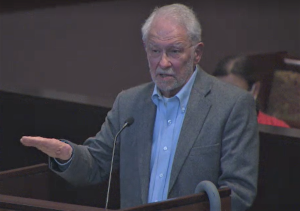
Spannaus said that when the group started researching the cemetery, there were only nine known headstones. Through the work of mostly Claudette Bard and Howard Timbers, they’ve now documented about 30 burials, but according to neighbors, there could be as many as 100 souls buried there. The condition of the property is a disgrace, Spannaus said. This ought to be treated as sacred ground. He said their group is asking the Board to help, in whatever way they find is appropriate, to clear and restore the cemetery, and to preserve and protect the cemetery as sacred ground.
The final speaker on the subject of Mount Sinai was Ron Campbell of the Loudoun Freedom Center, who spoke as a member of the Mount Sinai Family & Friends group. Campbell said if we could resurrect all those buried in Loudoun County, that would be a good thing. We can’t do that, he said, but we can spiritually resurrect the stories and lives of the people who lived here. Campbell talked about the importance of people knowing their family history. “We have to go back, in order to move ahead.”
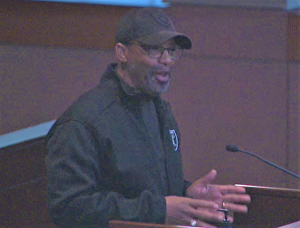
Campbell noted the many people, historians and others, and numbers of organizations, who are working to discover and preserve our history. This work shouldn’t all fall on the County, but where things remain uncovered, the County can provide resources and direction. He urged the Supervisors to seriously consider the work of the Family & Friends of Mount Sinai Cemetery, and to do what they can to help – while keeping in mind that this is just one piece of the work that needs to be done.
Over the coming weeks, the Board is expected to make known its plans for acquiring, or otherwise protecting, the historic Mount Sinai Cemetery property.
